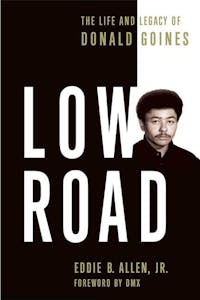Low Road
The Life and Legacy of Donald Goines
 Download image
Download image
ISBN10: 0312383517
ISBN13: 9780312383510
Paperback
224 Pages
$19.99
CA$21.99
Donald Goines was a pimp, truck driver, heroin addict, factory worker, and career criminal. He was also one of the most popular black contemporary writers, having published sixteen novels, including Whoreson, Dopefiend, and Daddy Cool. Goines's unique brand of "street narrative" and "ghetto realism" mark him as the original street writer.
Now, in the first in-depth biography of Goines's life, author Eddie B. Allen, Jr. explores exactly how one man made the transition from street hustler to bestselling author. With access to personal letters, treatments from unwritten books, photographs, and family members, Allen uncovers Goines's experiences with drugs, prostitutes, prison, and urban violence. Fans of Goines's novels will note a dramatic parallelism between his life and fictional tales.
Reviews
Praise for Low Road
"[A] comprehensive look at the gritty novelist's own thug life, [Low Road] unfolds like a fast-paced thriller that mirrors Goines's popular bestsellers."—Essence magazine
"In an in-depth biography of the original street-fiction author, Donald Goines, Allen examines the life of the late author who influenced all your favorite rappers."—The Source
"Allen illuminates the life and writings of arguably the most influential chronicler of black urban life in the post-World War II era. Goines' legacy is maintained by a hip-hop generation that is just as invisible and ignored. Eddie B. Allen, Jr. . . . thankfully brings that legacy into even sharper focus."—BlackVoices.com
"For readers who are looking for the definitive story of Donald Goines's life, a wonderful addition to their bookshelves about black popular culture and its icons, and simply, a great read, this is the book."—Black Issues Book Review
"Before there was urban fiction there was Donald Goines. Allen examines the life of Goines, a pimp and hustler who, inspired by urban writer Ice Berg Slim, wrote about the life he lived, a life that may have contributed to his violent and untimely death. Goines, born the only son in a middle-class black family in Detroit, became a writer and chronicler of the gritty side of urban life. Goines cranked out Dopefiend (1971), Whoreson (1972), and 13 other titles while fighting heroin addiction and coping with the limited prospects for a drug-addicted black man in 1960s America. On the basis of interviews with Goines' family and friends, and correspondence left by the author, Allen offers a portrait of a tortured man who suffered a color complex because of his fair skin, a longing to get beyond the restrictions of race, the pull of a life of crime and violence, and a strangling drug addiction that both inspired and destroyed him. Readers interested in the genesis of urban fiction and hip-hop influences will appreciate this look at an early pioneer."—Booklist
"It is indicative of both the explosive nature of Goines's subject matter (his works include Whoreson; Dopefiend and Black Gangster) and the timidity of the academy that Goines's achievement selling more than five million books of utterly uncompromised fiction has received little scholarly attention. Critic Allen's thorough and well-documented study will do much to change that, placing Goines's life and work in a coherent critical, historical and social frame. This book is clearly a labor of love, all the more creditable because Goines is often hard to like. A hustler, pimp and junkie who rejected his hard-working father's middle-class ethos, Goines hardly stood out from any number of doomed young men until, during a prison term, the spreading fame of Iceberg Slim reached him. The old story of redemption by art is vividly retold here, and the sense of Goines's growing awareness and ambition is well caught, as are the exigencies of paperback publication. Tragically, Goines could leave neither his addiction nor his violent past behind, and he was murdered—a case that remains unsolved—at the age of 35, in 1947. This work argues not only for a serious assessment of what Goines did achieve, but makes us mourn what he never got the chance to."—Publishers Weekly

